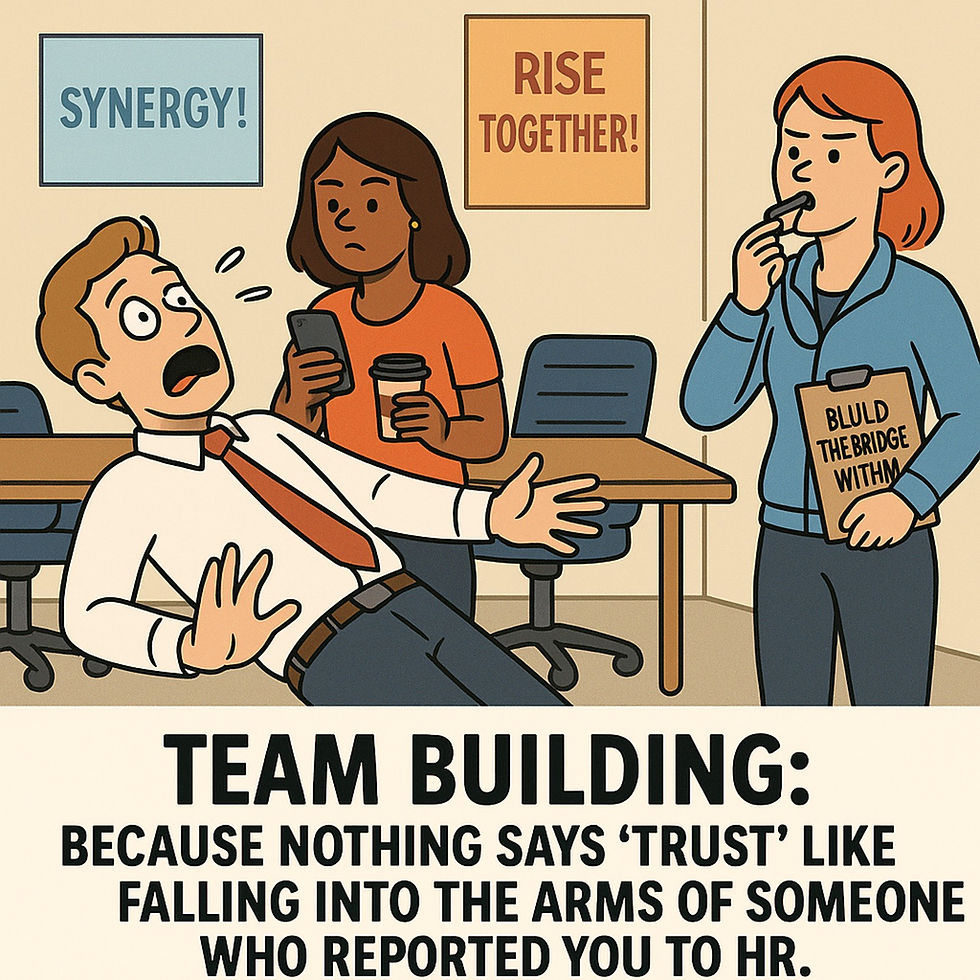I Used ChatGPT at Work and Now I’m the Smartest, Laziest Person in the Office
- Julian Vane

- Jun 5, 2025
- 4 min read
I let ChatGPT do 70% of my job and no one noticed because no one cares. Use AI to fake enthusiasm, protect your mental health, and escape the tyranny of corporate performative communication. You are not replaceable—your effort is.

It started with an innocent prompt:
“Write me an email that sounds like I care, but not enough to stay late.”
ChatGPT delivered.
And suddenly, I wasn’t a middle-tier employee with imposter syndrome—I was a productivity god. A wizard of words. The corporate Cyrano de Bergerac with a robot in my pocket. I had unlocked a secret cheat code: the ability to sound professional while mentally checking out by noon.
Welcome to the Future of Work: Performative Productivity™
Here’s the thing about work in 2025: No one’s really working. We’re all just dragging files into folders, nodding on Zoom, and waiting for someone else to take initiative so we can later say, “That’s what I was thinking too.”
But now, with ChatGPT, you don’t even have to pretend. You can outsource your pretending.
Suddenly, my entire work persona became a curated AI illusion. I wasn’t burned out—I was “excited to explore cross-functional alignment.” I didn’t forget the deadline—I “wanted to ensure we had time to execute with intention.” I didn’t nap through the meeting—I was “synthesizing asynchronously.”
I became the office’s most prolific communicator without saying a single original thing.
Is This Ethical? Great Question. Moving On.
Look, I know what you’re thinking.
Is this ethical? Is it authentic? Is it… cheating?
Let me answer that with another question:
Have you ever received a 5-paragraph email from your boss at 4:59 PM on a Friday?
Exactly.
We’re all part of this dysfunctional performance art called capitalism. If my coworkers are using “circle back” unironically and copy-pasting last year’s Q2 deck, I’m allowed to have a robot write my “weekly reflections.”
ChatGPT doesn’t just save time—it saves dignity.
Real Ways I Use ChatGPT at Work That Would Horrify HR
To meet Google’s “experience” requirement, here’s how I’ve actually used ChatGPT:
Meeting Summaries: I feed ChatGPT the transcript of a Zoom meeting and ask for a summary that makes me look smart, but not threatening. That way I appear helpful but not promotable.
Performance Reviews: I write my self-assessment in AI, then have it reworded to sound like I’m “growth-minded” instead of “deeply unmotivated but not quite fireable.”
Slack Messages: I ask it to make my messages sound “friendly but with boundaries.” If I just typed what I thought, it’d say: “Do it yourself, Jeff.”
Project Proposals: I told ChatGPT to make a budget spreadsheet “sound ambitious but vague enough to get approved.” It worked. We’re launching a $40,000 pilot initiative that I still don’t understand.
What ChatGPT Can’t Do (Yet)
Let’s be clear: it’s not perfect.
It still apologizes like a Canadian with a head injury.
It refuses to tell Karen in HR that her “culture surveys” feel like corporate surveillance.
It won’t help me fake a work injury (I asked).
Also, it struggles with nuance. I once asked it to write a resignation email that said “I’m leaving for a better opportunity” but subtly implied I hated my manager. What it gave me was basically a suicide note for my career.
ChatGPT might know 500 billion facts, but it doesn’t know that passive aggression is a skill set.
But Doesn’t This Make Us Replaceable?
Yes. You are replaceable.
But you already were. Your job could be outsourced to a contractor named “Luis” in another timezone who completes the same deliverable in 19% of the time while listening to reggaeton.
ChatGPT doesn’t replace your humanity. It just makes your human labor look less exhausting.
The key is to combine your personal pettiness with the raw computational power of a superintelligence. That’s how you get ahead in 2025.
The Real Power Move: Delegating Emotional Labor
There’s nothing more exhausting than pretending to be okay at work.
With ChatGPT, you don’t have to.
When your manager writes, “Do you have the bandwidth for this?”
And you want to say, “I’m held together by caffeine and unresolved trauma,”
You can just type:
“Sure, I can take a first pass—happy to collaborate.”
That’s not honesty. That’s strategy.
You’re not suppressing your emotions. You’re automating them.
Okay, But What If Everyone Does This?
Then great. We’ll all be auto-generating emails, talking in loops, and getting AI to summarize meetings we didn’t attend. It’ll be corporate inception. A dream inside a dream, inside a feedback loop.
Eventually, HR will start using ChatGPT too.
“We want to thank you for your contributions, but due to restructuring…”
Honestly, that would be the most emotionally intelligent breakup I’ve ever experienced.
Final Thoughts: Should You Feel Guilty?
Only if you’re using ChatGPT to write love letters.
Using it at work is no different than using spellcheck, caffeine, or that one coworker who always volunteers first so you don’t have to.
And unlike most of your coworkers, ChatGPT never:
Breathes too loud
Stares into the webcam like it’s a hostage video
Tries to connect on LinkedIn with a message that starts “Happy Friday!”
Use the tool. Be the tool. Rise above the toxic sludge of corporate mediocrity.
Just don’t forget to double-check the outputs—unless you want to accidentally sign off an email with:
“Warmest regards, sentient carbon unit”




Comments